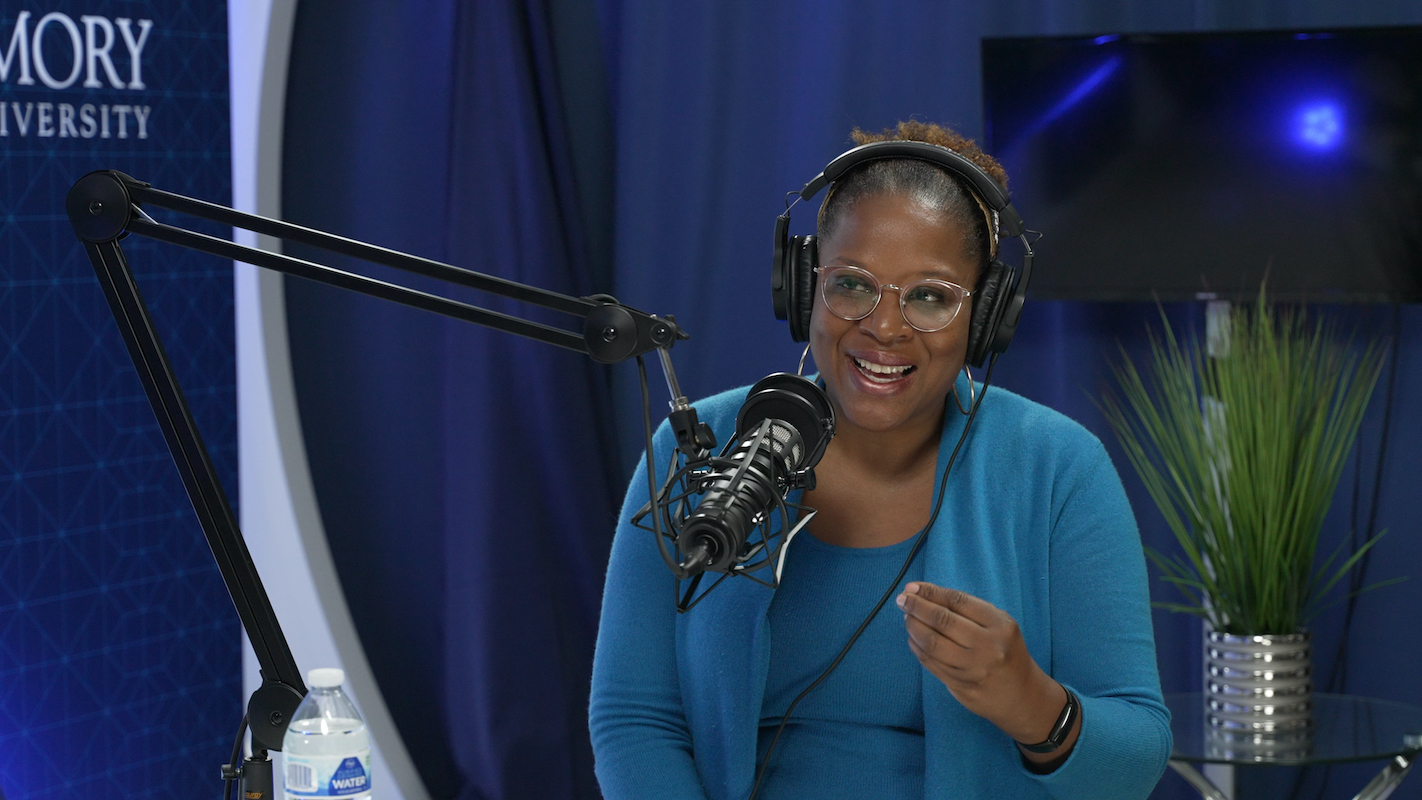Tayari Jones is one of the most accomplished novelists working today. She is the author of four books, including the bestseller, “An American Marriage,” which was an Oprah’s Book Club official selection in 2018. Jones was honored with the Hurston/Wright Legacy Award for Debut Fiction and was also the recipient of a 2021 Guggenheim Fellowship.
On the latest episode of his podcast, One Big Question, Emory President Gregory L. Fenves interviews Jones, who is the Charles Howard Candler Professor of Creative Writing at Emory University. On the podcast, Fenves sits down with Emory authors, inventors, researchers, alumni and more to learn about their experiences and areas of expertise. The first episode featured epidemiologist and social media star Laurel Bristow, and the next episode will feature Emory College alumnus Christopher Mims, who pens the Wall Street Journal tech column, Keywords.
Tayari Jones, who was once stunned to learn she could take a creative writing class, now teaches creative writing and is is one of the most accomplished novelists of today.
During the interview with Jones, Fenves starts by asking, “Why do you, an acclaimed novelist with an audience around the world, dedicate your teaching time to undergraduate students at Emory, and especially students that are in disciplines that, at least on the surface, appear to have nothing to do with writing?”
Jones laughs before answering Fenves, then continues, “Well, in my opinion, the undergraduate classroom is really where the magic happens. When I was a young person, I took a creative writing class. And one, I was stunned to find out that you could actually take a class in creative writing.”
The class Jones is referring to was taught by Pearl Cleage at Spelman College. Two decades before Jones’ success with her novel, Cleage’s book “What Looks Like Crazy on an Ordinary Day” was the Oprah’s Book Club selection in 1998.
During a conversation hosted by Emory Libraries three years ago, Jones admitted that she forged her advisor’s signature to be able to take Cleage’s class as a first-year student. Like Jones, Cleage is a Spelman alumna who grew up in southwest Atlanta. Both use Atlanta and its history as a backdrop for their stories.
In “An American Marriage,” a young newlywed couple — Roy and Celestial — find their happily ever after dashed when Roy is wrongfully incarcerated for a crime he didn’t commit. When he’s finally released, he finds that the world and the woman he left behind are very different. Jones was inspired to write the novel after overhearing a couple arguing at Lenox Square Mall. She heard the woman say, “You wouldn’t have waited for me for seven years.”
On One Big Question, Fenves asks Jones, “How do you teach your students to relate to their own experience and then express that in a character that may be very different than who they are?”
To which Jones replies in part, “One thing people do when they're starting writing is they say, ‘Oh, I want to write about someone so different from me.’ I think part of that is because to examine the self is the most challenging thing.… I ask them, ‘What is the history of your name?’ Because when you can tell how you got your name, it tells us a lot about who you are. It tells us about your parents' ambition for you, what kind of culture you're from.”
During the episode, Fenves and Jones try that exercise.
Fenves: If you gave that assignment to me, the history of my name, it'd be about two or three sentences. How do you get students to think more deeply than just the surface of who they are?
Jones: Give me those two or three sentences. I'm ready.
Fenves: Okay. Let's see. My mother named me Gregory because ... well, in the 1950s I think it was a common name. That's all I know.
Jones: Well, that's a lot to know. That means your mother wanted you to have a name that wouldn't stand out like a sore thumb. She wanted you to get along with other people. She wanted you to have a name that was legible. It was the 1950s when that kind of legibility was a huge part of the culture. So that tells us right there, some context.
If you take my name, Tayari, which is Swahili, which means “she is prepared,” you can tell right away I was born in 1970 and that my parents were part of this kind of African American cultural reclamation movement, and they did not care one bit that I had a name that no one could spell or pronounce. So, it's really the opposite impulse.
Fenves: Oh, my goodness. I have got to take your class.
Listen to the full conversation between Jones and Fenves now. The next episode of One Big Question will be posted Sept. 28.
In his new podcast series, President Gregory L. Fenves asks Emory experts big questions about society, the challenges we face, and the unexpected, bold, ambitious and brave solutions they’ve discovered.
The first three episodes will be posted every other Wednesday starting Aug. 31.One Big Question

